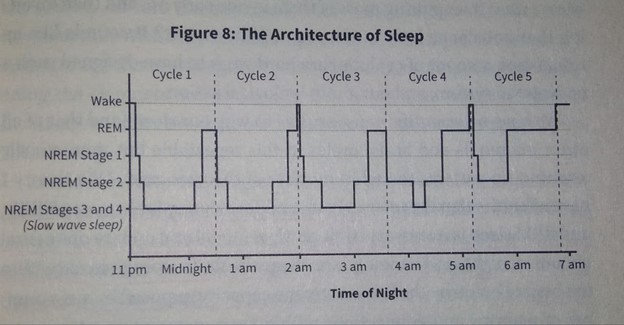World Health Organization (WHO) recommends average eight hours of sleep per night for adults. Two-thirds of adults throughout all developed nations fail to obtain it. This has led to WHO declaring sleep loss epidemic throughout industrialized nations.
Why WHO is so much concerned about 8 hours? Why NASA and Google are incentivizing their employees to sleep? Why is Japan adding a nap time in the noon for children in school? What is it about sleep that we do not know?
Though we may not know the science behind it, but most of know that it is vital for us to remain fresh and sane in day to day life. When someone is tired or lacking focus, we say “sleep for some time.” How does quality sleep makes us feel refreshed, focused and happy? I will try to answer these questions in simple language in this blog.
In this fast-paced world where gadgets and internet has reached our bedrooms, social media and binge watching has replaced our book-reading habit before sleep, we find it more and more difficult to give ourselves a good-night sleep though we flood the inbox of our loved ones with good-night messages. This has caused a havoc in our life in a subtle way.
You might be surprised by the consequences of nonfulfillment of 7-9 hours of nightly sleep. Routinely sleeping less than six or seven hours a night demolishes your immune system, and increases the risk of cancer. Insufficient sleep is a key lifestyle factor in determining whether or not you will develop Alzheimer’s disease. Inadequate sleep- even moderate reductions for one week- disrupts blood sugar levels so profoundly that you would be classified as pre-diabetic. Short sleeping increases the likelihood of your coronary arteries becoming blocked and brittle, setting you on a path toward cardiovascular disease, stroke, and congestive heart failure.
SCARED? You should be!
When you do not get sufficient sleep you will have desire to eat more. It’s because too little sleep swells concentration of a hormone that makes you feel hungry while suppressing a companion hormone that otherwise signals food satisfaction. Hence, if you want to lose weight, sleep properly.
Shakespeare in 1611 in his tragedy play, Macbeth, eloquently described sleep as “the chief nourisher in life’s feast.” He could not be more correct. Sleep is indeed solution to many of our problems. Do you lack focus while studying? Do you feel depressed, anxious, and restless? Do you find it hard to memorise things you want study? Try getting more sleep.
So, what is it about 7-9 (average 8) hours of sleep per night for adults? Why not get 4 hours at night and 4 hours in the noon? (I used to do this earlier, but I realize it now that it was detrimental to my physical and mental health). Why do newly born sleep for more than 19 hours a day. Why it is recommended not to wake your child forcefully in the morning? All of these has to do with what our brain does while sleeping. Many of you may have read or heard about sleep cycles. Feeling like an alien? Don’t worry, this is what this blog is for. I will not go into too much of technical details as it will make it boring to read and my purpose of writing this will get self-defeated.
As I was saying, our brain goes through around five sleep-cycles during 8 hours of sleep. One cycle is of around 90-100 minutes. This duration may not be same for every individual. And each cycle has its own importance, which is why it is recommended to get quality 8 hours in one go.
There are 5-stages:
- Rapid Eye Movement (REM Sleep)
- Non-rapid Eye Movement Stage 1 (NREM Stage1)
- NREM Stage 2
- NREM Stage 3 (deep sleep)
- NREM Stage 4 (deep sleep)
Reason for why it is called rapid eye movement: your eye-balls move rapidly under your eyelids during these stages of your sleep. Hard to believe? Check your co-sleeper’s eyelids carefully, after he/she has fallen asleep.
Each cycle contains all these stages of sleep but of varying degrees.

As you can see in the graph, earlier cycles of your 8 hours sleep are dominated by NREM Stage 3 & 4, while later cycles of your sleep are dominated by NREM Stage 2 (lighter sleep) and REM (stage where you see dreams). There is constant war between REM and NREM sleep, where each loses and win in every 90 minutes cycles. So, what is the function of REM and NREM sleep? Why does each cycle goes through REM and NREM in this dramatically asymmetric pattern? There is no scientific consensus for this question but there is a theory which tries to answer it.
Throughout the time you are awake, your brain is continuously collecting information (what you read, what you see, what you do etc.), but the memory space in our brain is finite. Hence, our brain needs to weed out unimportant informations, and make space for new important information for next day. You might be thinking how does our brain decides what is important and what is not important? Do you remember your teacher saying you to “revise, revise, revise” before exams? That is exactly how your brain decides. Now a days, you may notice the constant urge to check notifications on your phone, and you even do it unconsciously. Relatable, right? It is because you have spent a huge amount of time with your phone and now it is set in your subconscious mind that checking your phone is a very important task in your life. Hence whatever you do repeatedly, your brain gets the signal that it is something important to remember. I am reminded of “Aaal is well” scene in Three Idiots, where Amir Khan says “dimag bewakoof hai, usko jo bologey wahi maan lega.” Similarly, we often play some fun-time memories and tragedies of our life so many times in our mind, that our brain keeps it in “important to remember” slot.
In the earlier cycles where your sleep is dominated by Non-rapid Eye Movement (NREM) stages, your brain removes unnecessary information and manages the memory storage crisis. And in later cycles, it strengthens the information which it finds important and strengthens it. It is like cementing the memory, and doing the finishing-work. This cementing happens during your REM (dreaming) phase. In this phase, your mind shows some kind of theatrical show on a screen. You see dreams. This is the phase where your memory is getting strong. This is why you should not wake up children early. This is crucial phase which needs to be completed so that they can retain what they have studied earlier in their long term memory.
Another key function of NREM sleep (deep sleep) is, it is crucial for long term memory. During this, memory transfer happens. When you are awake, the information gathered by your brain is stored in ‘hippocampus’ which is your temporary memory. And in this NREM phase, the information from hippocampus is transferred to ‘cortex’ which is your more permanent or long term memory. Hippocampus has very little memory space which needs to be cleared again and again. You might have noticed when you are studying continuously for long hours, after certain point you are not able to retain anything you are reading. And after you sleep and wake up, you again start to retain what you read. This is because your hippocampus got filled and when you slept, the information was transferred to cortex and memory space was created in it. This process of transfer of information, weeding out unnecessary and overlapping information, and lastly, cementing all the important information happens repeatedly through several cycles of REM and NREM sleep.
Hence, disrupting this cycles is not recommended and is highly detrimental to your physical and mental health in long term. You should always prioritize 7-9 hours of sleep per night. Every day we learn tons of new things which our brain needs to process. Let it do its work and see the magic yourself. It will increase your productivity, creativity, improve your memory, and help you stay healthy. It will boost your happiness and help you deal with your mood swings.
Lack of sufficient sleep is hampering not only our physical and mental health but also the economic health of our country by decreasing the productivity of our labour force. Many road accidents happens due to drivers being half-asleep and causes the loss of valuable lives. Our most importantly our health workers and doctors who perform lifesaving operations do not get good amount of sleep due to their workload and staff-crunch. Pilots operating international flights passing through several time zones within a day go through traumatic experienced due to disruption to their circadian rhythm. All these are genuine problems which has no easy solution. It requires a societal change, our attitude needs to change towards a healthy sleep routine. Government and corporations need to bring in a work culture where sleep is not hampered, instead workers need to be incentivize to get a good sleep. NASA and Google has already moved in this direction to increase the productivity and minimize the economic loss.
I would like to conclude this now. Managing and controlling your brain is a tough task. Like former Pakistani ISI chief said, “Pakistan took the help of America to defeat America in Afghanistan”, we need to use our brain to control our brain. It does whatever we say to it, but we need to give it a quality sleep every night for it to function at its optimum potential.
Note: All the knowledge I have shared in this article is taken from the book “Why We Sleep” by Matthew Walker. The paragraph where I have written about the consequences of insufficient sleep on our health is mostly copy pasted from the first page of first chapter of the book. The graph is also taken from the book. As the main reason for writing this was to educate about the benefits and necessity of having a quality sleep, I did not dwell upon concepts of circadian rhythm, effects of caffeine on our sleep and so on. If you are interested in learning more about your sleep, I would recommend you to read the book. Take care and sleep well. It is the elixir of life.
Writes: Akash Basisth Sharma


Be the first to comment on "Sleep: Why it matters?"